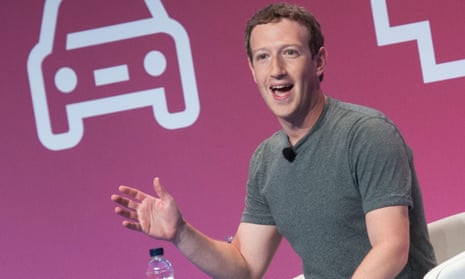Mark Zuckerberg’s public persona is somewhat different from that of most chief executives of digital companies. The timeline of Twitter boss Jack Dorsey, for instance, isn’t full of homely paeans to the good folk of Waco, Texas, and how much they can teach you about the importance of community. Zuckerberg’s Facebook page is. The Microsoft chief executive Satya Nadella doesn’t post on his LinkedIn profile about his meetings with local police departments. Zuckerberg does on Facebook. The Google Plus page of Larry Page does not contain a picture of the Alphabet CEO stroking a calf at a Texan rodeo. Zuckerberg’s Facebook page does.
This isn’t the outcome of idiosyncratic social media sharing from America’s nerd king. Instead, it’s a deeply considered strategy, carried out by a full-time staff of dozens of people, according to Bloomberg News. That headcount includes 12 or so employees moderating the comment feeds under each of his posts, a number of professional photographers who trail him on his engagements, both business and personal, and a handful of Facebook employees who help him write his posts and speeches. Those are all complemented with regular appearances of Zuckerberg “going live” for off-the-cuff Q&As with Facebook users.
While his Facebook page has been a work of manicured corporate communications genius for a while now, Zuckerberg stepped it up in 2017 when he announced his “annual challenge” for the year. In a departure from previous years, when the annual challenges were made up of playboy hobbies like hunting with a bow and arrow, or building a voice-controlled smart home, in 2017 Zuckerberg hopes “to have visited and met people in every state in the US by the end of the year”.
It doesn’t take a superpowerful AI to add two and two together, here: Mark Zuckerberg is acting an awful lot like someone preparing to run for president. Vanity Fair’s Nick Bilton quotes a “nothing but gossip” theory that he has his eye on a run in 2024, based on conversations with “influential figures” in Silicon Valley. The election of Donald Trump may have pushed that up a notch, but Zuckerberg would only barely scrape the legal minimum age for the presidency (35 years old) in 2020, when he will be 36.
In recent years, Zuckerberg has reassessed his fairly apolitical past, and apparently decided to be the change he wants to see in the world. That has had an effect on his professional life, where he has publicly scolded employees for leaving anti-Black Lives Matter graffiti around the office, shortly before Facebook put up an enormous Black Lives Matter sign of its own at its Menlo Park headquarters.
It’s also led to the creation of Internet.org, Facebook’s philanthropic arm aimed at bringing internet access to the developing world – the so-called next billion of internet users. The organisation has acted with hard-nosed business acumen in some ways, negotiating with mobile carriers in countries like Angola and India to offer a limited selection of sites to customers for free (including Facebook, naturally). But it is also throwing cash at more speculative endeavours, including a fleet of solar-powered, laser-equipped drones which would circle in the stratosphere beaming data down to remote areas.
The politicisation of Zuckerberg has had even more of an affect on his personal life. He and his wife, the doctor Priscilla Chan, have committed to giving away 99% of the value of their Facebook shares to charitable causes, going so far as to rewrite the corporate structure of the company so that Zuckerberg can sell billions of dollars of shares while still maintaining a majority of voting rights.
A year of meet-and-greets across the US is certainly a more pleasant way to build a political profile than the current president’s entry into politics through years of relentlessly hammering away with a racist conspiracy theory that the first black president wasn’t really American. And while little polling exists on the subject, evidence suggests that Zuckerberg’s personal popularity is already very high for a billionaire chief executive, with an opinion poll from February 2016 giving him a net favourability rating of 22%. President Trump, by contrast, currently stands at minus eight.
But a more nuanced reading of Zuckerberg’s public persona, and of his thinking around Facebook’s position in American public life, suggests an alternative possibility: what if this is nothing to do with the presidency, and everything to do with what Zuckerberg considers an appropriate image for the living embodiment of Facebook?
Facebook has a direct effect on the lives of more than a billion users worldwide, mediating access to friends and family, to retail and commercial opportunities, and to media organisations. It provides an encrypted communications channel to a billion users – disproportionately in the developing world – through WhatsApp, and subsidises internet access for hundreds of millions more through Internet.org.
It’s also clear that the company itself is deeply concerned about its public image in a way normally reserved for actors in the political sphere. In the wake of the US election, for instance, Facebook users were surveyed to find out whether they though the site was “good for the world”. If they said it wasn’t, they were offered follow-ups including “too much fake information”, “personal privacy and data are not secure” or “reduces real-life contact and interactions”.
As the chief executive of Facebook, Zuckerberg has far more power over his domain than a typical president does. There’s no democratic accountability, no Congress to appease, and even the votes that do happen are impossible for him to lose: despite owning just 28% of Facebook, he holds 56% of the voting rights at board meetings, thanks to the company’s unique corporate structure.
So it makes sense that the company and the person are seen, to a certain extent, as inseparable. If Zuckerberg wants to improve the image of Facebook, he needs to also improve his own image. A 22% net approval rating is good for a politician, but a company needs more broad-based appeal, particularly one which wants to be the sole mediator of the world’s information exchange.
If Zuckerberg doesn’t want to run for president, maybe we should be glad. If Facebook were a state, it would be one of the more repressive regimes in the world: centralised censorship enforcing a prudish morality that sees control of women’s bodies as more important than fighting fascism, an institutional opposition to personal privacy that goes so far as to ban the use of pseudonyms in almost any situation, and a carrot-and-stick relationship with a media which relies on it for funding and distribution even as it tries desperately to hold it to account.
At least with Zuckerberg as head of Facebook, rather than head of the US, you have another option: just log off.

